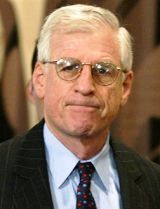During five months at UN, Danforth’s prime concern was bringing peace to Sudan
By EDITH M. LEDERER, Associated Press Writer
UNITED NATIONS, Dec 3, 2004 (AP) — During his five months at the United Nations, U.S. Ambassador John Danforth has focused on one goal — bringing peace to Sudan which has been engulfed in wars for 21 years.
 Danforth, whose resignation was confirmed Thursday by the U.S. Mission to the United Nations, didn’t succeed. But he got a promise from southern rebels and the Sudanese government to end their long civil war by the end of the year, though no solution to the more recent deadly conflict in the western Darfur region.
Danforth, whose resignation was confirmed Thursday by the U.S. Mission to the United Nations, didn’t succeed. But he got a promise from southern rebels and the Sudanese government to end their long civil war by the end of the year, though no solution to the more recent deadly conflict in the western Darfur region.
Danforth had been mentioned as a successor to U.S. Secretary of State Colin Powell, but President George W. Bush chose Condoleezza Rice instead.
Danforth sent his letter of resignation on Nov. 22, six days after the Rice appointment, saying he wanted to retire with his wife, Sally, to his home in St. Louis on Jan. 20 when Bush’s first term ends. The president responded with a letter on Nov. 27 accepting his resignation, said U.S. spokesman Richard Grenell, who did not disclose its contents.
“Forty-seven years ago, I married the girl of my dreams, and, at this point in my life, what is most important to me is to spend more time with her,” Danforth wrote. “Because you know Sally, you know my reason for going home.”
Mrs. Danforth suffered a serious fall about 1 1/2 years ago and still suffers from the after-effects.
Danforth, 68, a Republican and former Missouri senator, has been tapped by presidents of both parties as a troubleshooter. He told Bush “not to hestitate” to call on him for short-term projects.
Danforth arrived at the United Nations in early July to replace John Negroponte who went to Baghdad as the first post-Saddam U.S. ambassador to Iraq’s transitional government.
After the bitter divisions in the U.N. Security Council over the war in Iraq, the arrival of a new U.S. ambassador was viewed by many diplomats as a fresh start.
In recent months, he has been pressing U.N. Secretary-General Kofi Annan to send more election staffers to help with the Jan. 30 vote. Annan recently raised the ceiling on U.N. international staff allowed in the country from 35 to 59, but won’t go higher because of escalating violence — to the annoyance of U.S. officials.
But unlike Negroponte whose time at the United Nations was consumed by the aftermath of the Sept. 11, 2001 terrorist attacks and the war in Iraq, Danforth was consumed by Sudan though he spent time on other African problems and also worked hard to strengthen the U.N. machinery to fight terrorism.
Before taking up his U.N. job, Danforth was the U.S. point man on Sudan. At the United Nations, he kept the spotlight on the need to end the country’s 21-year civil war and the more recent wave of killings, looting, and village burnings in the western Darfur region that have killed over 70,000 people and forced 1.8 million to flee from their homes.
Last month, when he presided over the council as its president, Danforth organized a council meeting in Nairobi — only the fourth outside New York since 1952 — to pressure southern rebels and the Sudanese government to end their war. He has argued repeatedly that ending the civil war is the key to peace in Darfur.
Danforth’s outgoing personality and politician’s ease with people made him personally popular with both the press and his fellow ambassadors on the U.N. Security Council though many disagreed with U.S. policy, particularly on the Israeli-Palestinian conflict.
In early October, he vetoed an Arab-backed Security Council resolution condemning an Israeli raid in Gaza. He called it “lopsided and unbalanced,” because it did not mention Palestinian rocket attacks.
He often told people — “I am not a diplomat” — and after the freewheeling life of a politician he felt constrained at times by having to check his speeches and statements with Washington.
Looking back, Danforth told the president “It has been an important time to be in this position, especially as we attempt to enlist greater U.N. participation in the future of Iraq, and as we advance the interest you have personally shown in helping the desperate people of Sudan.”
“I am proud to be part of your administration,” he said. “I hope you will always know that I am your friend.”
